Corporation Law Essay: Evaluating the Statement on Incorporation
VerifiedAdded on 2023/01/18
|6
|2493
|47
Essay
AI Summary
This essay delves into the complexities of corporation law, specifically addressing the statement, "The case for incorporation is overstated." The work begins by outlining the advantages of corporate structures, such as separate legal identity, limited liability, and the ability to raise significant capital, contrasting these benefits with alternative business forms like sole proprietorships and partnerships. The essay then critically examines the disadvantages, including the complexities and costs associated with incorporation and the potential for misuse of corporate structures. It explores the legal safeguards in place, such as the duties of directors outlined in the Corporations Act, 2001 (Cth), and the concept of lifting the corporate veil to protect stakeholders. The analysis covers the importance of financial reporting, director responsibilities, and various legal precedents, ultimately arguing that while incorporation presents challenges, its benefits outweigh the drawbacks, thus refuting the initial statement.
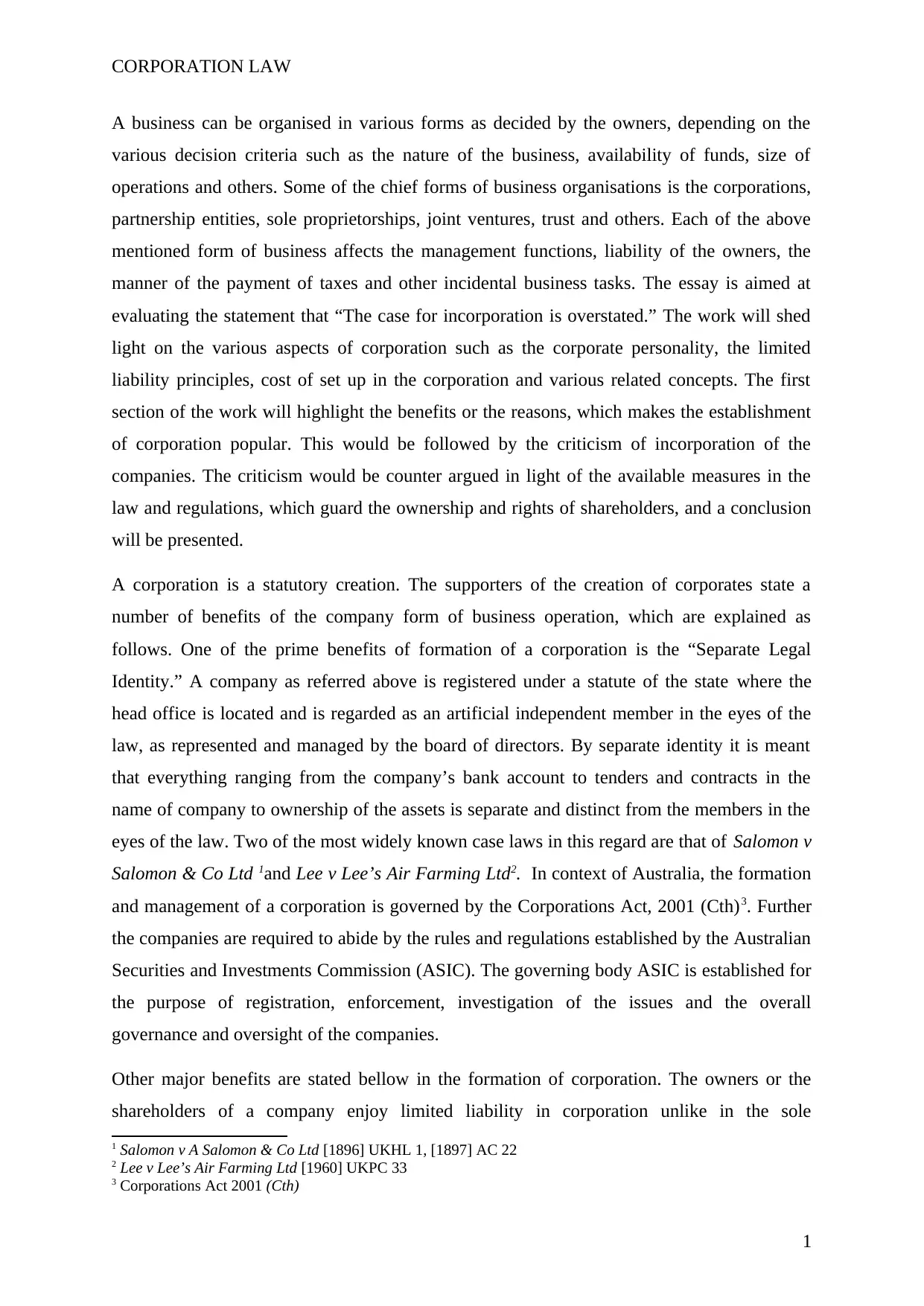
CORPORATION LAW
A business can be organised in various forms as decided by the owners, depending on the
various decision criteria such as the nature of the business, availability of funds, size of
operations and others. Some of the chief forms of business organisations is the corporations,
partnership entities, sole proprietorships, joint ventures, trust and others. Each of the above
mentioned form of business affects the management functions, liability of the owners, the
manner of the payment of taxes and other incidental business tasks. The essay is aimed at
evaluating the statement that “The case for incorporation is overstated.” The work will shed
light on the various aspects of corporation such as the corporate personality, the limited
liability principles, cost of set up in the corporation and various related concepts. The first
section of the work will highlight the benefits or the reasons, which makes the establishment
of corporation popular. This would be followed by the criticism of incorporation of the
companies. The criticism would be counter argued in light of the available measures in the
law and regulations, which guard the ownership and rights of shareholders, and a conclusion
will be presented.
A corporation is a statutory creation. The supporters of the creation of corporates state a
number of benefits of the company form of business operation, which are explained as
follows. One of the prime benefits of formation of a corporation is the “Separate Legal
Identity.” A company as referred above is registered under a statute of the state where the
head office is located and is regarded as an artificial independent member in the eyes of the
law, as represented and managed by the board of directors. By separate identity it is meant
that everything ranging from the company’s bank account to tenders and contracts in the
name of company to ownership of the assets is separate and distinct from the members in the
eyes of the law. Two of the most widely known case laws in this regard are that of Salomon v
Salomon & Co Ltd 1and Lee v Lee’s Air Farming Ltd2. In context of Australia, the formation
and management of a corporation is governed by the Corporations Act, 2001 (Cth)3. Further
the companies are required to abide by the rules and regulations established by the Australian
Securities and Investments Commission (ASIC). The governing body ASIC is established for
the purpose of registration, enforcement, investigation of the issues and the overall
governance and oversight of the companies.
Other major benefits are stated bellow in the formation of corporation. The owners or the
shareholders of a company enjoy limited liability in corporation unlike in the sole
1 Salomon v A Salomon & Co Ltd [1896] UKHL 1, [1897] AC 22
2 Lee v Lee’s Air Farming Ltd [1960] UKPC 33
3 Corporations Act 2001 (Cth)
1
A business can be organised in various forms as decided by the owners, depending on the
various decision criteria such as the nature of the business, availability of funds, size of
operations and others. Some of the chief forms of business organisations is the corporations,
partnership entities, sole proprietorships, joint ventures, trust and others. Each of the above
mentioned form of business affects the management functions, liability of the owners, the
manner of the payment of taxes and other incidental business tasks. The essay is aimed at
evaluating the statement that “The case for incorporation is overstated.” The work will shed
light on the various aspects of corporation such as the corporate personality, the limited
liability principles, cost of set up in the corporation and various related concepts. The first
section of the work will highlight the benefits or the reasons, which makes the establishment
of corporation popular. This would be followed by the criticism of incorporation of the
companies. The criticism would be counter argued in light of the available measures in the
law and regulations, which guard the ownership and rights of shareholders, and a conclusion
will be presented.
A corporation is a statutory creation. The supporters of the creation of corporates state a
number of benefits of the company form of business operation, which are explained as
follows. One of the prime benefits of formation of a corporation is the “Separate Legal
Identity.” A company as referred above is registered under a statute of the state where the
head office is located and is regarded as an artificial independent member in the eyes of the
law, as represented and managed by the board of directors. By separate identity it is meant
that everything ranging from the company’s bank account to tenders and contracts in the
name of company to ownership of the assets is separate and distinct from the members in the
eyes of the law. Two of the most widely known case laws in this regard are that of Salomon v
Salomon & Co Ltd 1and Lee v Lee’s Air Farming Ltd2. In context of Australia, the formation
and management of a corporation is governed by the Corporations Act, 2001 (Cth)3. Further
the companies are required to abide by the rules and regulations established by the Australian
Securities and Investments Commission (ASIC). The governing body ASIC is established for
the purpose of registration, enforcement, investigation of the issues and the overall
governance and oversight of the companies.
Other major benefits are stated bellow in the formation of corporation. The owners or the
shareholders of a company enjoy limited liability in corporation unlike in the sole
1 Salomon v A Salomon & Co Ltd [1896] UKHL 1, [1897] AC 22
2 Lee v Lee’s Air Farming Ltd [1960] UKPC 33
3 Corporations Act 2001 (Cth)
1
Paraphrase This Document
Need a fresh take? Get an instant paraphrase of this document with our AI Paraphraser
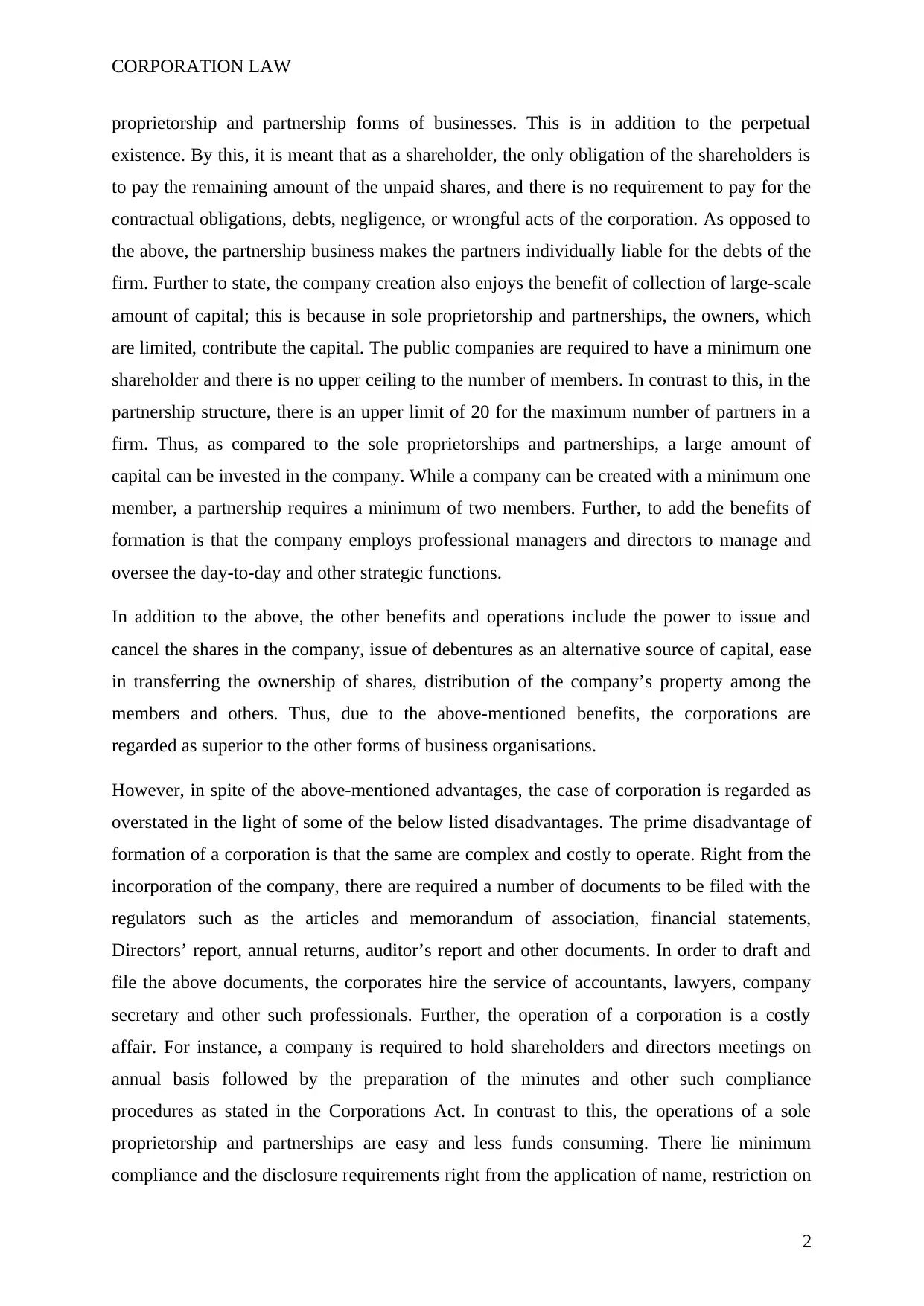
CORPORATION LAW
proprietorship and partnership forms of businesses. This is in addition to the perpetual
existence. By this, it is meant that as a shareholder, the only obligation of the shareholders is
to pay the remaining amount of the unpaid shares, and there is no requirement to pay for the
contractual obligations, debts, negligence, or wrongful acts of the corporation. As opposed to
the above, the partnership business makes the partners individually liable for the debts of the
firm. Further to state, the company creation also enjoys the benefit of collection of large-scale
amount of capital; this is because in sole proprietorship and partnerships, the owners, which
are limited, contribute the capital. The public companies are required to have a minimum one
shareholder and there is no upper ceiling to the number of members. In contrast to this, in the
partnership structure, there is an upper limit of 20 for the maximum number of partners in a
firm. Thus, as compared to the sole proprietorships and partnerships, a large amount of
capital can be invested in the company. While a company can be created with a minimum one
member, a partnership requires a minimum of two members. Further, to add the benefits of
formation is that the company employs professional managers and directors to manage and
oversee the day-to-day and other strategic functions.
In addition to the above, the other benefits and operations include the power to issue and
cancel the shares in the company, issue of debentures as an alternative source of capital, ease
in transferring the ownership of shares, distribution of the company’s property among the
members and others. Thus, due to the above-mentioned benefits, the corporations are
regarded as superior to the other forms of business organisations.
However, in spite of the above-mentioned advantages, the case of corporation is regarded as
overstated in the light of some of the below listed disadvantages. The prime disadvantage of
formation of a corporation is that the same are complex and costly to operate. Right from the
incorporation of the company, there are required a number of documents to be filed with the
regulators such as the articles and memorandum of association, financial statements,
Directors’ report, annual returns, auditor’s report and other documents. In order to draft and
file the above documents, the corporates hire the service of accountants, lawyers, company
secretary and other such professionals. Further, the operation of a corporation is a costly
affair. For instance, a company is required to hold shareholders and directors meetings on
annual basis followed by the preparation of the minutes and other such compliance
procedures as stated in the Corporations Act. In contrast to this, the operations of a sole
proprietorship and partnerships are easy and less funds consuming. There lie minimum
compliance and the disclosure requirements right from the application of name, restriction on
2
proprietorship and partnership forms of businesses. This is in addition to the perpetual
existence. By this, it is meant that as a shareholder, the only obligation of the shareholders is
to pay the remaining amount of the unpaid shares, and there is no requirement to pay for the
contractual obligations, debts, negligence, or wrongful acts of the corporation. As opposed to
the above, the partnership business makes the partners individually liable for the debts of the
firm. Further to state, the company creation also enjoys the benefit of collection of large-scale
amount of capital; this is because in sole proprietorship and partnerships, the owners, which
are limited, contribute the capital. The public companies are required to have a minimum one
shareholder and there is no upper ceiling to the number of members. In contrast to this, in the
partnership structure, there is an upper limit of 20 for the maximum number of partners in a
firm. Thus, as compared to the sole proprietorships and partnerships, a large amount of
capital can be invested in the company. While a company can be created with a minimum one
member, a partnership requires a minimum of two members. Further, to add the benefits of
formation is that the company employs professional managers and directors to manage and
oversee the day-to-day and other strategic functions.
In addition to the above, the other benefits and operations include the power to issue and
cancel the shares in the company, issue of debentures as an alternative source of capital, ease
in transferring the ownership of shares, distribution of the company’s property among the
members and others. Thus, due to the above-mentioned benefits, the corporations are
regarded as superior to the other forms of business organisations.
However, in spite of the above-mentioned advantages, the case of corporation is regarded as
overstated in the light of some of the below listed disadvantages. The prime disadvantage of
formation of a corporation is that the same are complex and costly to operate. Right from the
incorporation of the company, there are required a number of documents to be filed with the
regulators such as the articles and memorandum of association, financial statements,
Directors’ report, annual returns, auditor’s report and other documents. In order to draft and
file the above documents, the corporates hire the service of accountants, lawyers, company
secretary and other such professionals. Further, the operation of a corporation is a costly
affair. For instance, a company is required to hold shareholders and directors meetings on
annual basis followed by the preparation of the minutes and other such compliance
procedures as stated in the Corporations Act. In contrast to this, the operations of a sole
proprietorship and partnerships are easy and less funds consuming. There lie minimum
compliance and the disclosure requirements right from the application of name, restriction on
2
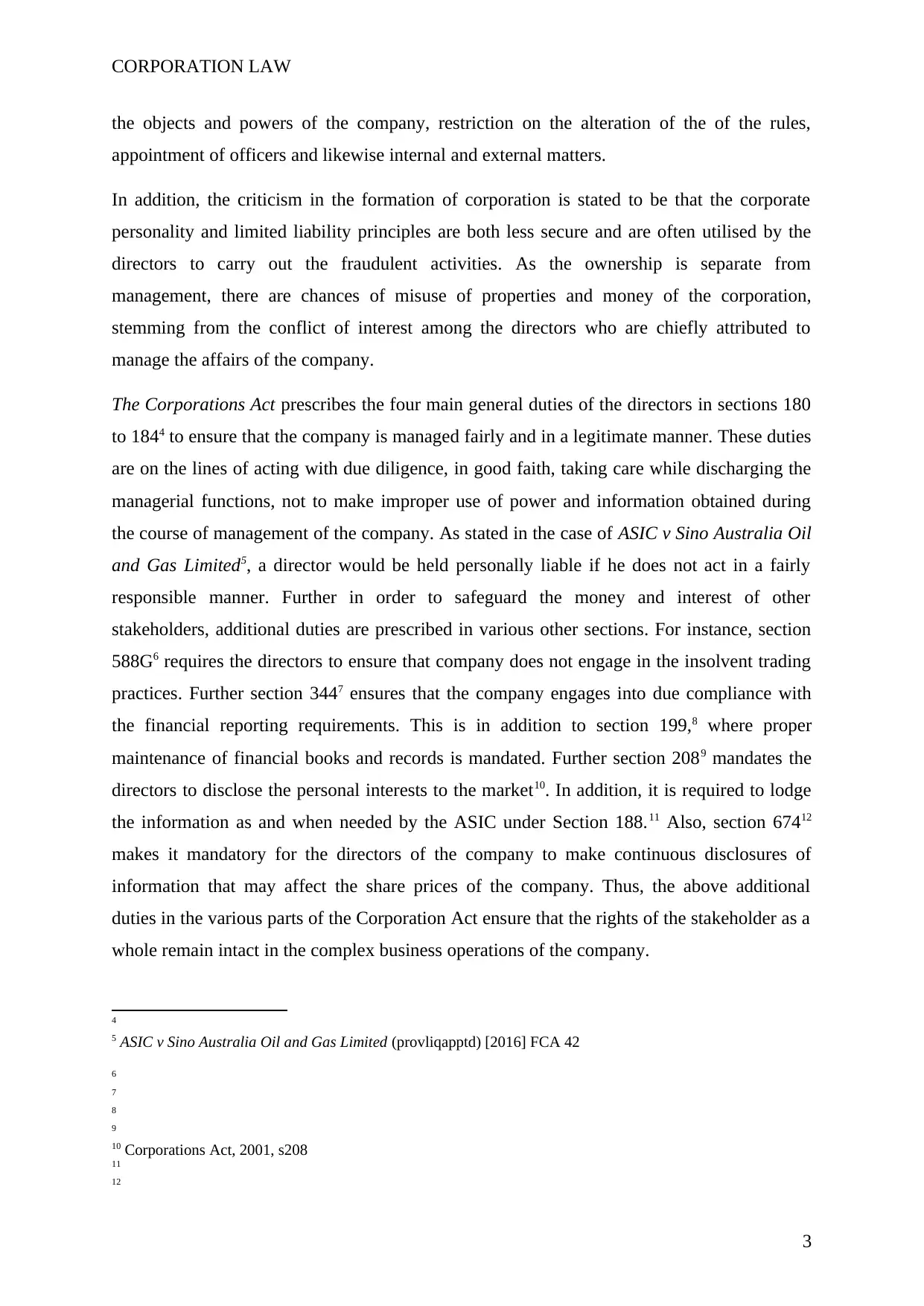
CORPORATION LAW
the objects and powers of the company, restriction on the alteration of the of the rules,
appointment of officers and likewise internal and external matters.
In addition, the criticism in the formation of corporation is stated to be that the corporate
personality and limited liability principles are both less secure and are often utilised by the
directors to carry out the fraudulent activities. As the ownership is separate from
management, there are chances of misuse of properties and money of the corporation,
stemming from the conflict of interest among the directors who are chiefly attributed to
manage the affairs of the company.
The Corporations Act prescribes the four main general duties of the directors in sections 180
to 1844 to ensure that the company is managed fairly and in a legitimate manner. These duties
are on the lines of acting with due diligence, in good faith, taking care while discharging the
managerial functions, not to make improper use of power and information obtained during
the course of management of the company. As stated in the case of ASIC v Sino Australia Oil
and Gas Limited5, a director would be held personally liable if he does not act in a fairly
responsible manner. Further in order to safeguard the money and interest of other
stakeholders, additional duties are prescribed in various other sections. For instance, section
588G6 requires the directors to ensure that company does not engage in the insolvent trading
practices. Further section 3447 ensures that the company engages into due compliance with
the financial reporting requirements. This is in addition to section 199,8 where proper
maintenance of financial books and records is mandated. Further section 2089 mandates the
directors to disclose the personal interests to the market10. In addition, it is required to lodge
the information as and when needed by the ASIC under Section 188.11 Also, section 67412
makes it mandatory for the directors of the company to make continuous disclosures of
information that may affect the share prices of the company. Thus, the above additional
duties in the various parts of the Corporation Act ensure that the rights of the stakeholder as a
whole remain intact in the complex business operations of the company.
4
5 ASIC v Sino Australia Oil and Gas Limited (provliqapptd) [2016] FCA 42
6
7
8
9
10 Corporations Act, 2001, s208
11
12
3
the objects and powers of the company, restriction on the alteration of the of the rules,
appointment of officers and likewise internal and external matters.
In addition, the criticism in the formation of corporation is stated to be that the corporate
personality and limited liability principles are both less secure and are often utilised by the
directors to carry out the fraudulent activities. As the ownership is separate from
management, there are chances of misuse of properties and money of the corporation,
stemming from the conflict of interest among the directors who are chiefly attributed to
manage the affairs of the company.
The Corporations Act prescribes the four main general duties of the directors in sections 180
to 1844 to ensure that the company is managed fairly and in a legitimate manner. These duties
are on the lines of acting with due diligence, in good faith, taking care while discharging the
managerial functions, not to make improper use of power and information obtained during
the course of management of the company. As stated in the case of ASIC v Sino Australia Oil
and Gas Limited5, a director would be held personally liable if he does not act in a fairly
responsible manner. Further in order to safeguard the money and interest of other
stakeholders, additional duties are prescribed in various other sections. For instance, section
588G6 requires the directors to ensure that company does not engage in the insolvent trading
practices. Further section 3447 ensures that the company engages into due compliance with
the financial reporting requirements. This is in addition to section 199,8 where proper
maintenance of financial books and records is mandated. Further section 2089 mandates the
directors to disclose the personal interests to the market10. In addition, it is required to lodge
the information as and when needed by the ASIC under Section 188.11 Also, section 67412
makes it mandatory for the directors of the company to make continuous disclosures of
information that may affect the share prices of the company. Thus, the above additional
duties in the various parts of the Corporation Act ensure that the rights of the stakeholder as a
whole remain intact in the complex business operations of the company.
4
5 ASIC v Sino Australia Oil and Gas Limited (provliqapptd) [2016] FCA 42
6
7
8
9
10 Corporations Act, 2001, s208
11
12
3
⊘ This is a preview!⊘
Do you want full access?
Subscribe today to unlock all pages.

Trusted by 1+ million students worldwide
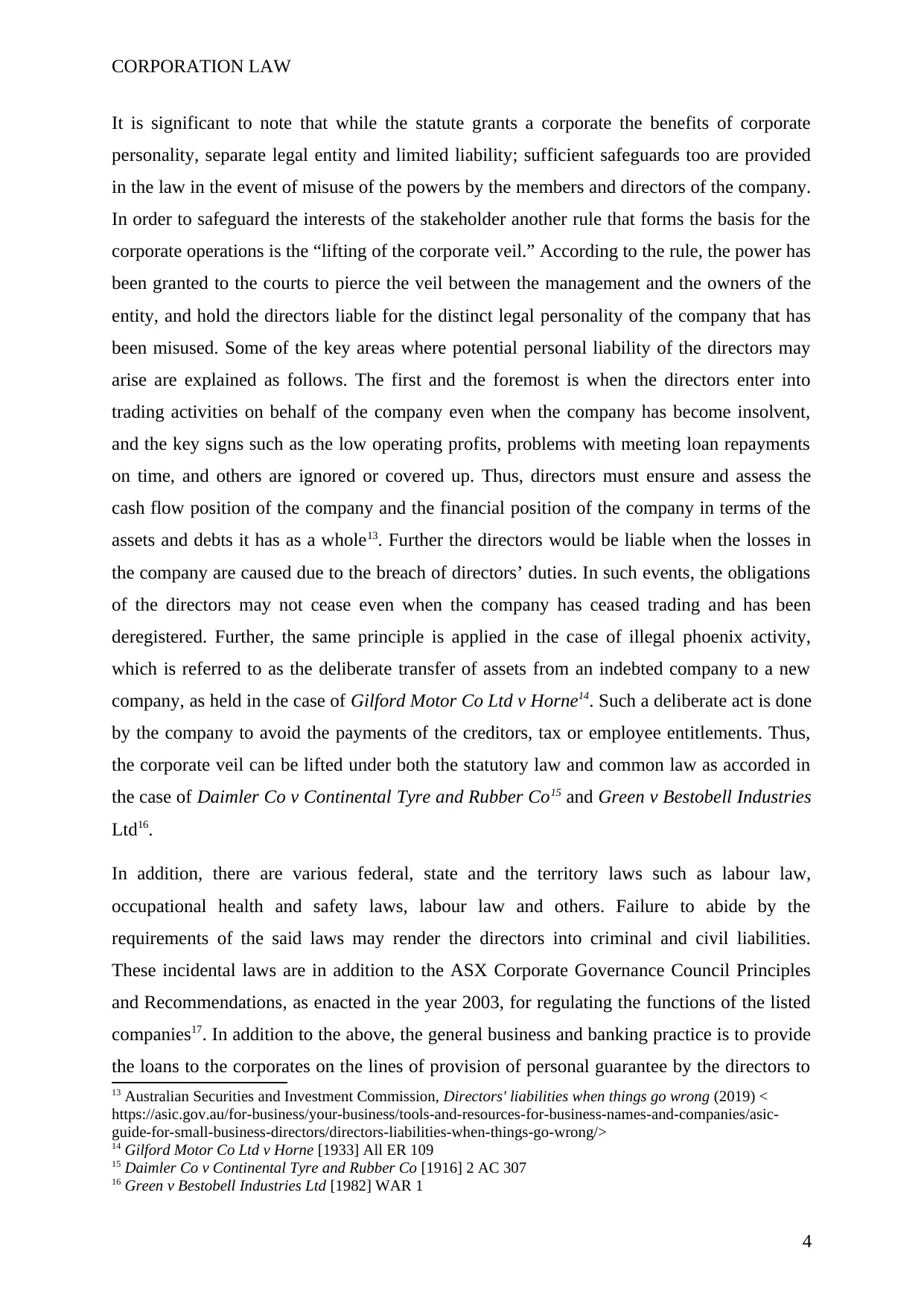
CORPORATION LAW
It is significant to note that while the statute grants a corporate the benefits of corporate
personality, separate legal entity and limited liability; sufficient safeguards too are provided
in the law in the event of misuse of the powers by the members and directors of the company.
In order to safeguard the interests of the stakeholder another rule that forms the basis for the
corporate operations is the “lifting of the corporate veil.” According to the rule, the power has
been granted to the courts to pierce the veil between the management and the owners of the
entity, and hold the directors liable for the distinct legal personality of the company that has
been misused. Some of the key areas where potential personal liability of the directors may
arise are explained as follows. The first and the foremost is when the directors enter into
trading activities on behalf of the company even when the company has become insolvent,
and the key signs such as the low operating profits, problems with meeting loan repayments
on time, and others are ignored or covered up. Thus, directors must ensure and assess the
cash flow position of the company and the financial position of the company in terms of the
assets and debts it has as a whole13. Further the directors would be liable when the losses in
the company are caused due to the breach of directors’ duties. In such events, the obligations
of the directors may not cease even when the company has ceased trading and has been
deregistered. Further, the same principle is applied in the case of illegal phoenix activity,
which is referred to as the deliberate transfer of assets from an indebted company to a new
company, as held in the case of Gilford Motor Co Ltd v Horne14. Such a deliberate act is done
by the company to avoid the payments of the creditors, tax or employee entitlements. Thus,
the corporate veil can be lifted under both the statutory law and common law as accorded in
the case of Daimler Co v Continental Tyre and Rubber Co15 and Green v Bestobell Industries
Ltd16.
In addition, there are various federal, state and the territory laws such as labour law,
occupational health and safety laws, labour law and others. Failure to abide by the
requirements of the said laws may render the directors into criminal and civil liabilities.
These incidental laws are in addition to the ASX Corporate Governance Council Principles
and Recommendations, as enacted in the year 2003, for regulating the functions of the listed
companies17. In addition to the above, the general business and banking practice is to provide
the loans to the corporates on the lines of provision of personal guarantee by the directors to
13 Australian Securities and Investment Commission, Directors' liabilities when things go wrong (2019) <
https://asic.gov.au/for-business/your-business/tools-and-resources-for-business-names-and-companies/asic-
guide-for-small-business-directors/directors-liabilities-when-things-go-wrong/>
14 Gilford Motor Co Ltd v Horne [1933] All ER 109
15 Daimler Co v Continental Tyre and Rubber Co [1916] 2 AC 307
16 Green v Bestobell Industries Ltd [1982] WAR 1
4
It is significant to note that while the statute grants a corporate the benefits of corporate
personality, separate legal entity and limited liability; sufficient safeguards too are provided
in the law in the event of misuse of the powers by the members and directors of the company.
In order to safeguard the interests of the stakeholder another rule that forms the basis for the
corporate operations is the “lifting of the corporate veil.” According to the rule, the power has
been granted to the courts to pierce the veil between the management and the owners of the
entity, and hold the directors liable for the distinct legal personality of the company that has
been misused. Some of the key areas where potential personal liability of the directors may
arise are explained as follows. The first and the foremost is when the directors enter into
trading activities on behalf of the company even when the company has become insolvent,
and the key signs such as the low operating profits, problems with meeting loan repayments
on time, and others are ignored or covered up. Thus, directors must ensure and assess the
cash flow position of the company and the financial position of the company in terms of the
assets and debts it has as a whole13. Further the directors would be liable when the losses in
the company are caused due to the breach of directors’ duties. In such events, the obligations
of the directors may not cease even when the company has ceased trading and has been
deregistered. Further, the same principle is applied in the case of illegal phoenix activity,
which is referred to as the deliberate transfer of assets from an indebted company to a new
company, as held in the case of Gilford Motor Co Ltd v Horne14. Such a deliberate act is done
by the company to avoid the payments of the creditors, tax or employee entitlements. Thus,
the corporate veil can be lifted under both the statutory law and common law as accorded in
the case of Daimler Co v Continental Tyre and Rubber Co15 and Green v Bestobell Industries
Ltd16.
In addition, there are various federal, state and the territory laws such as labour law,
occupational health and safety laws, labour law and others. Failure to abide by the
requirements of the said laws may render the directors into criminal and civil liabilities.
These incidental laws are in addition to the ASX Corporate Governance Council Principles
and Recommendations, as enacted in the year 2003, for regulating the functions of the listed
companies17. In addition to the above, the general business and banking practice is to provide
the loans to the corporates on the lines of provision of personal guarantee by the directors to
13 Australian Securities and Investment Commission, Directors' liabilities when things go wrong (2019) <
https://asic.gov.au/for-business/your-business/tools-and-resources-for-business-names-and-companies/asic-
guide-for-small-business-directors/directors-liabilities-when-things-go-wrong/>
14 Gilford Motor Co Ltd v Horne [1933] All ER 109
15 Daimler Co v Continental Tyre and Rubber Co [1916] 2 AC 307
16 Green v Bestobell Industries Ltd [1982] WAR 1
4
Paraphrase This Document
Need a fresh take? Get an instant paraphrase of this document with our AI Paraphraser
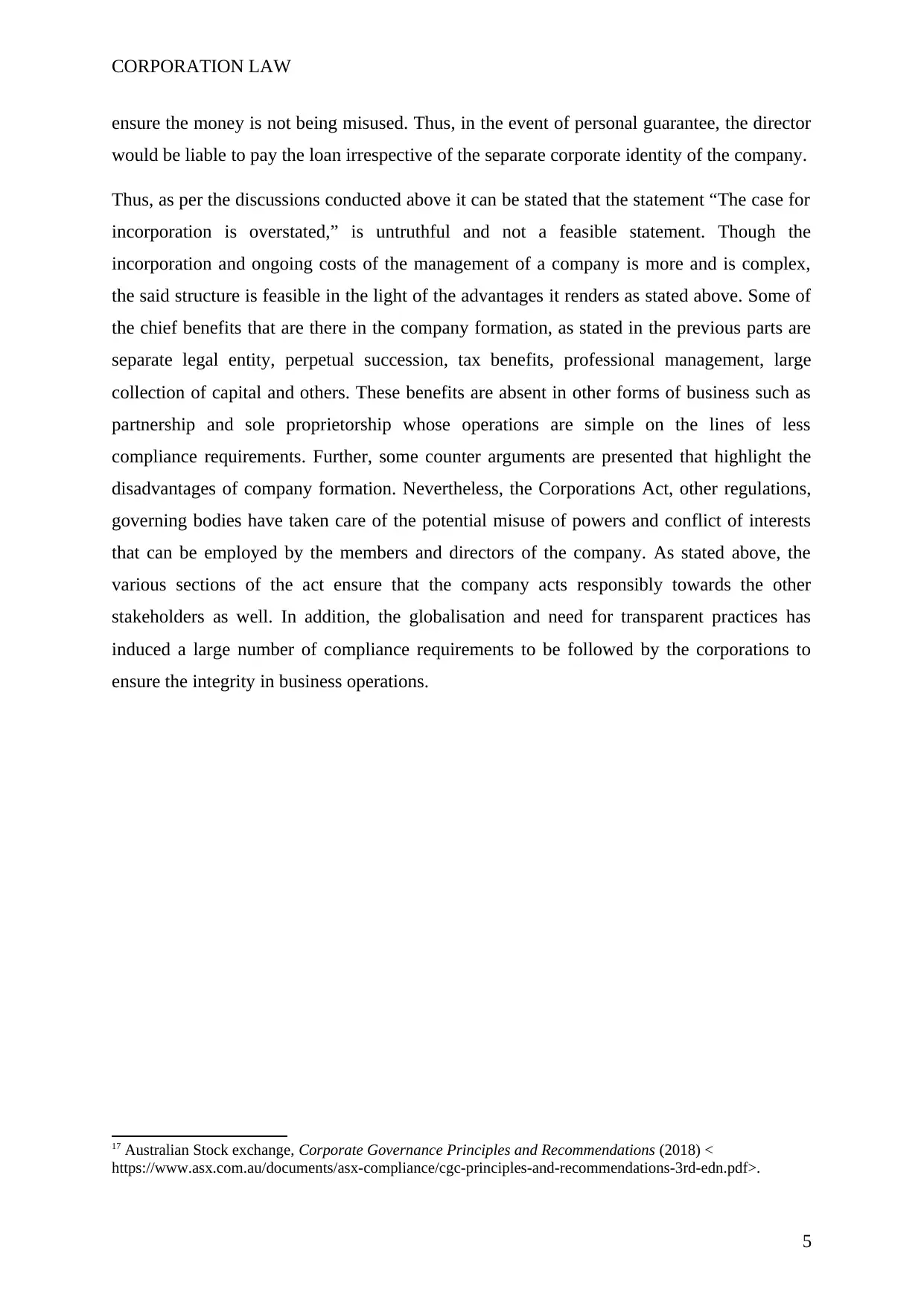
CORPORATION LAW
ensure the money is not being misused. Thus, in the event of personal guarantee, the director
would be liable to pay the loan irrespective of the separate corporate identity of the company.
Thus, as per the discussions conducted above it can be stated that the statement “The case for
incorporation is overstated,” is untruthful and not a feasible statement. Though the
incorporation and ongoing costs of the management of a company is more and is complex,
the said structure is feasible in the light of the advantages it renders as stated above. Some of
the chief benefits that are there in the company formation, as stated in the previous parts are
separate legal entity, perpetual succession, tax benefits, professional management, large
collection of capital and others. These benefits are absent in other forms of business such as
partnership and sole proprietorship whose operations are simple on the lines of less
compliance requirements. Further, some counter arguments are presented that highlight the
disadvantages of company formation. Nevertheless, the Corporations Act, other regulations,
governing bodies have taken care of the potential misuse of powers and conflict of interests
that can be employed by the members and directors of the company. As stated above, the
various sections of the act ensure that the company acts responsibly towards the other
stakeholders as well. In addition, the globalisation and need for transparent practices has
induced a large number of compliance requirements to be followed by the corporations to
ensure the integrity in business operations.
17 Australian Stock exchange, Corporate Governance Principles and Recommendations (2018) <
https://www.asx.com.au/documents/asx-compliance/cgc-principles-and-recommendations-3rd-edn.pdf>.
5
ensure the money is not being misused. Thus, in the event of personal guarantee, the director
would be liable to pay the loan irrespective of the separate corporate identity of the company.
Thus, as per the discussions conducted above it can be stated that the statement “The case for
incorporation is overstated,” is untruthful and not a feasible statement. Though the
incorporation and ongoing costs of the management of a company is more and is complex,
the said structure is feasible in the light of the advantages it renders as stated above. Some of
the chief benefits that are there in the company formation, as stated in the previous parts are
separate legal entity, perpetual succession, tax benefits, professional management, large
collection of capital and others. These benefits are absent in other forms of business such as
partnership and sole proprietorship whose operations are simple on the lines of less
compliance requirements. Further, some counter arguments are presented that highlight the
disadvantages of company formation. Nevertheless, the Corporations Act, other regulations,
governing bodies have taken care of the potential misuse of powers and conflict of interests
that can be employed by the members and directors of the company. As stated above, the
various sections of the act ensure that the company acts responsibly towards the other
stakeholders as well. In addition, the globalisation and need for transparent practices has
induced a large number of compliance requirements to be followed by the corporations to
ensure the integrity in business operations.
17 Australian Stock exchange, Corporate Governance Principles and Recommendations (2018) <
https://www.asx.com.au/documents/asx-compliance/cgc-principles-and-recommendations-3rd-edn.pdf>.
5
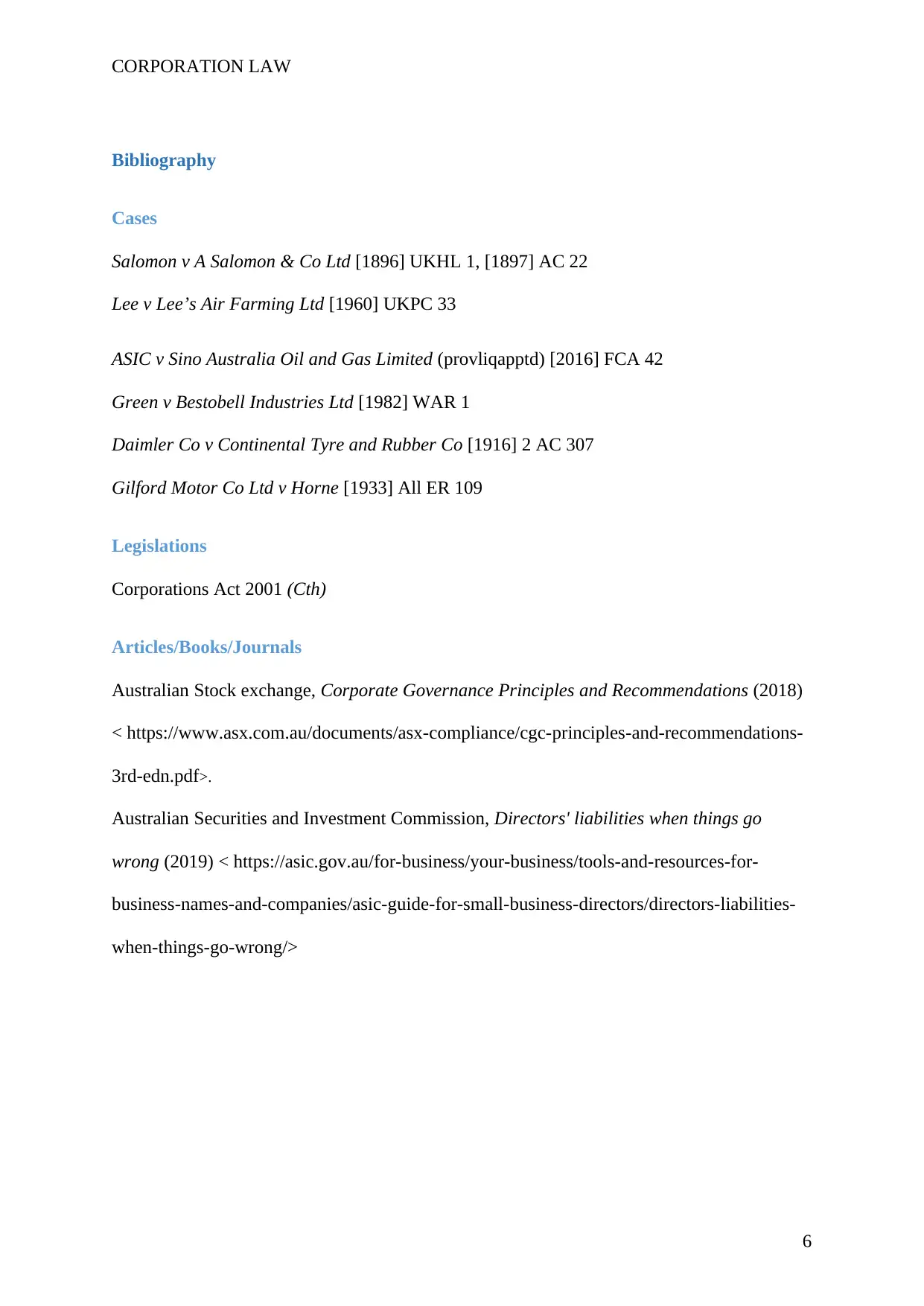
CORPORATION LAW
Bibliography
Cases
Salomon v A Salomon & Co Ltd [1896] UKHL 1, [1897] AC 22
Lee v Lee’s Air Farming Ltd [1960] UKPC 33
ASIC v Sino Australia Oil and Gas Limited (provliqapptd) [2016] FCA 42
Green v Bestobell Industries Ltd [1982] WAR 1
Daimler Co v Continental Tyre and Rubber Co [1916] 2 AC 307
Gilford Motor Co Ltd v Horne [1933] All ER 109
Legislations
Corporations Act 2001 (Cth)
Articles/Books/Journals
Australian Stock exchange, Corporate Governance Principles and Recommendations (2018)
< https://www.asx.com.au/documents/asx-compliance/cgc-principles-and-recommendations-
3rd-edn.pdf>.
Australian Securities and Investment Commission, Directors' liabilities when things go
wrong (2019) < https://asic.gov.au/for-business/your-business/tools-and-resources-for-
business-names-and-companies/asic-guide-for-small-business-directors/directors-liabilities-
when-things-go-wrong/>
6
Bibliography
Cases
Salomon v A Salomon & Co Ltd [1896] UKHL 1, [1897] AC 22
Lee v Lee’s Air Farming Ltd [1960] UKPC 33
ASIC v Sino Australia Oil and Gas Limited (provliqapptd) [2016] FCA 42
Green v Bestobell Industries Ltd [1982] WAR 1
Daimler Co v Continental Tyre and Rubber Co [1916] 2 AC 307
Gilford Motor Co Ltd v Horne [1933] All ER 109
Legislations
Corporations Act 2001 (Cth)
Articles/Books/Journals
Australian Stock exchange, Corporate Governance Principles and Recommendations (2018)
< https://www.asx.com.au/documents/asx-compliance/cgc-principles-and-recommendations-
3rd-edn.pdf>.
Australian Securities and Investment Commission, Directors' liabilities when things go
wrong (2019) < https://asic.gov.au/for-business/your-business/tools-and-resources-for-
business-names-and-companies/asic-guide-for-small-business-directors/directors-liabilities-
when-things-go-wrong/>
6
⊘ This is a preview!⊘
Do you want full access?
Subscribe today to unlock all pages.

Trusted by 1+ million students worldwide
1 out of 6
Related Documents
Your All-in-One AI-Powered Toolkit for Academic Success.
+13062052269
info@desklib.com
Available 24*7 on WhatsApp / Email
![[object Object]](/_next/static/media/star-bottom.7253800d.svg)
Unlock your academic potential
Copyright © 2020–2026 A2Z Services. All Rights Reserved. Developed and managed by ZUCOL.





